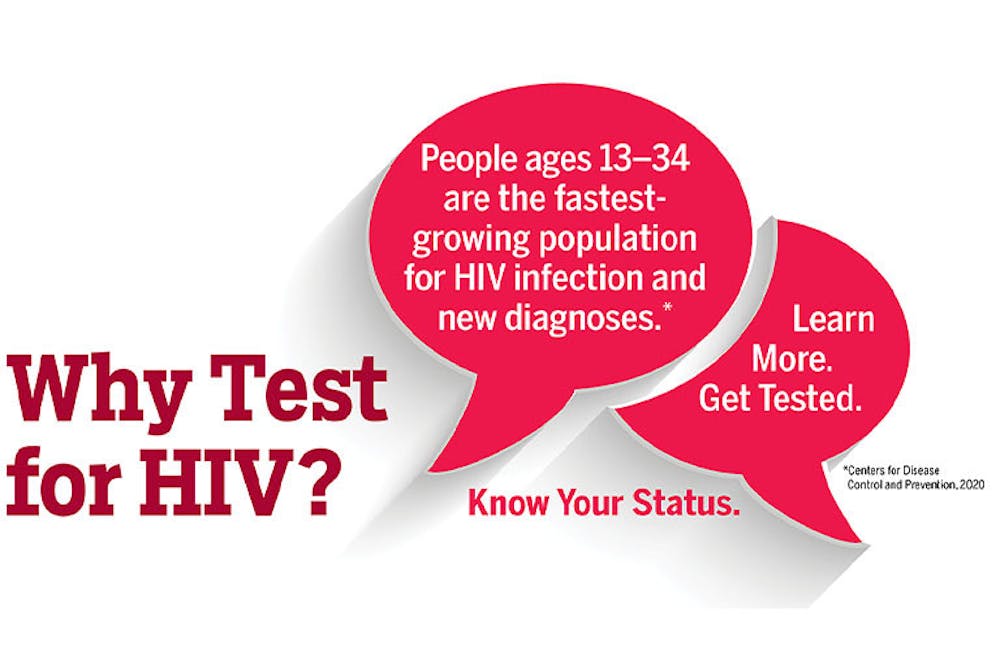The cultural centers at Indiana University are partnering with Positive Link to host free HIV testing events from Sept. 27 to April 10, 2024.
The events, according to an IU press release, will be held in public places to increase visibility and decrease the stigma associated with sexual health. All identifying information and testing records are kept confidential.
Positive Link, according to their website, provides HIV prevention resources and services for those living with HIV through IU Health.
Bruce Smail, director of the LGBTQ+ Culture Center and special assistant to the vice president for diversity, equity and inclusion, said each center will have a day dedicated to HIV testing. Many of these testing days are also national HIV awareness days.
HIV awareness days are days dedicated to raising awareness around HIV prevention and treatment. And a specific population, like National Black HIV/AIDS awareness day on Feb. 7, 2024; which is when free testing will be at the Neal-Marshall Black Culture Center.
The free testing events will be from 5-7 p.m. on:
Sept. 27: LGBTQ+ Culture Center
Oct. 18: La Casa/Latino Cultural Center
Nov. 8: First Nations Educational and Cultural Center
Feb. 7: Neal-Marshall Black Culture Center
March 6: Jewish Culture Center
April 10: Asian Culture Center
The culture centers, Smail said, are trying to bring attention to the need for HIV testing and bring awareness to, of the new cases of HIV, a large number of them are within the 16 to 24 age group.
[Related: Biden administration resumes free at-home COVID-19 testing program]
In the state of Indiana, according to the Center for Disease Control and Prevention, more than 13,000 people are living with HIV and in the U.S. people aged 25-34 have the highest rate of annual HIV infections.
Smail said there are communities at higher risk of contracting HIV, including Black men, Latino men and women of color. According to the CDC, there are five populations disproportionally impacted by HIV, including men who have sex with men, particularly Black, Latino and American Indian/Alaskan Native men, Black women and those aged 13-24 years old.
Smail said he thinks it’s important for people to test to see their status so they can know how to protect themselves. Or if a person becomes HIV positive, Smail said, to get care during that stage.
Positive Link, one of the partners of the LGBTQ+ Culture Center, has previously partnered with the La Casa/Latino Cultural Center and the Neal-Marshall Black Culture Center, Smail said. But these partnerships haven’t been consistent when compared to the LGBTQ+ Culture Center. Positive Link provides free HIV testing from 10 a.m. to 1 p.m. every Thursday at the LGBTQ+ Culture Center. They also provide monthly testing at the Neal-Marshall Black Culture Center.
Smail said this year is the first year HIV testing has pulled all the culture centers together. He said the cultural centers will hopefully continue to do testing on an annual basis.
“If we're creating HIV testing in all different communities, it's a great opportunity for anyone to get tested in any of the locations that they feel comfortable with or just dropped in and get tested,” Smail said.
Unlike the weekly testing offered at the LGBTQ+ Culture Center, Smail said, the events offer HIV awareness and education. Tool kits, like one preventing HIV and STIs, will be available along with testing.
Tool kits, Smail said in an email, represent the options available in HIV prevention and include external and internal condoms and dental dams, which are free at the LGBTQ+ Culture Center and Positive Link. The kits also include the medications Pre-Exposure Prophlylaxis (PrEP), nonoccupational Post-Exposure Prophylaxis (nPEP) and Undetectable=Untransmittable initative, which is helps people with HIV not transmit HIV with medication. Treatment cover, he said, depends on insurance.
PrEP and nPEP, Smail said, can be free based on a person’s insurance. The IU Student Health Center, he said, has a program to support students who are interested in PrEP if they don’t have insurance coverage.
At the testing events, Positive Link will test for both HIV and Hepatitis C along with one-on-one education, Emily Brinegar, IU Health Positive Link Prevention Manager, said.
Brinegar said the tests collect antibodies through a mouth swab or a finger stick. These tests provide rapid results and are antibody testing. She said Positive Link usually uses finger sticks as the test because this method is slightly more reliable and develops quicker than the oral HIV test.
According to the National Library of Medicine, rapid oral swabs reportedly have a lower sensitivity and specificity than rapid HIV testing done with whole blood and have been associated with clusters of false positives but are less invasive than finger sticks.
If someone is interested in testing, Brinegar said, one of the testers will meet with them individually and discuss their risk before testing. The results, she said, should be done within a few minutes.
[Related: Nationwide Emergency Alert Test to occur in October]
Brinegar said both the tests for HIV and Hepatitis C require a follow-up confirmatory test, which Positive Link does.
This is because, Brinegar said, false positives and negatives, while infrequent, may result from the HIV and Hepatitis C window period, from the time of exposure to time of antibody detection, which can be anywhere from several weeks to three months.
“If you have ever been exposed to Hepatitis C, that antibody test is going to come back reactive,” Brinegar said. “That one you definitely need the follow up testing to determine if you do have an active case of Hep C and the treatment.”
If a student tests positive, she said, Positive Link has several services, including primary care for people with HIV, treatment for Hepatitis C and access to PrEP. Positive Link also has a case management team that works with people living with HIV or Hepatitis C so they can access treatment and address any other needs.
“With HIV especially, it's a lifelong chronic illness now, so it can't be cured,” Brinegar said. “But it can be treated.”
If students can’t make it to the testing events, weekly testing events at the LGBTQ+ Culture Center, monthly testing events at the Neal-Marshall Black Culture Center or Positive Link’s walk-in hours every Monday and Tuesday from 2-6 p.m. at their offices, Brinegar said students should reach out to Positive Link at hivtesting@iuhealth.org.
“If people want to send an email to schedule a test, or have a question, they can also call and just talk with one of our testers about their risk and if they should get tested.” Brinegar said.
Knowing one’s status and their risk, she said, is important even if a person thinks they aren’t currently at risk because things can change in the future.
“There can be a lot of stigma around HIV and STIs in general,” Brinegar said. “But the fact of the matter is, they're a part of the human experience at this point and the more we talk about it, and the more we educate folks on what they need to know, the better the better off we will all be.”
[Related: COVID-19 cases, hospitalizations increase in Indiana]






